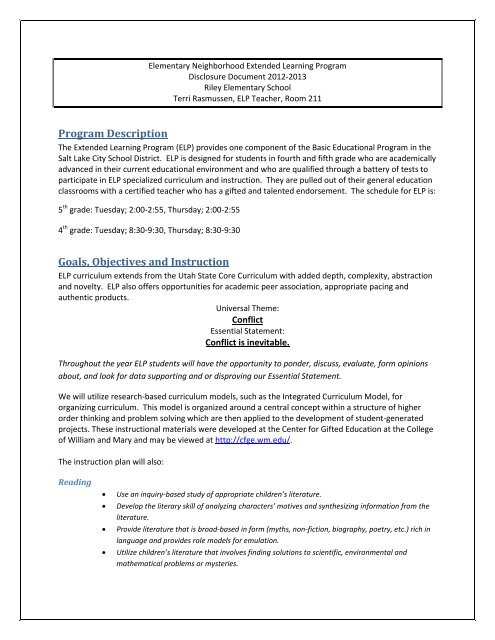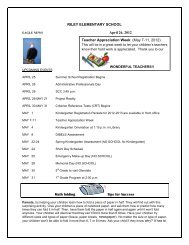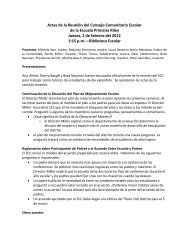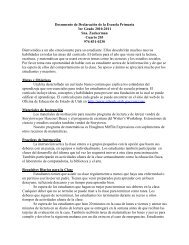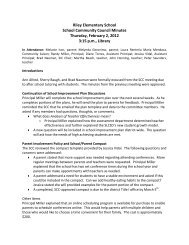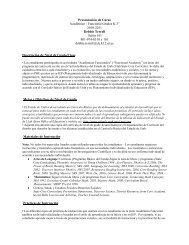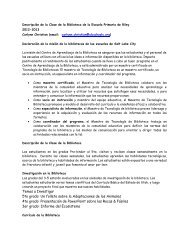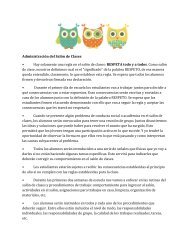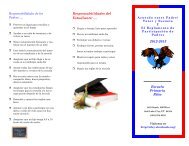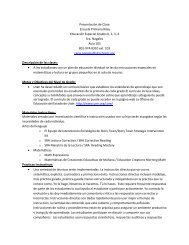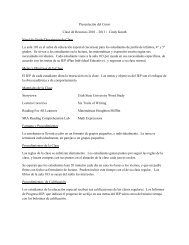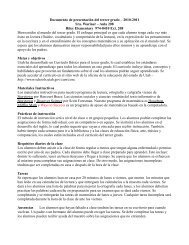Program Description Goals, Objectives and Instruction - Riley ...
Program Description Goals, Objectives and Instruction - Riley ...
Program Description Goals, Objectives and Instruction - Riley ...
You also want an ePaper? Increase the reach of your titles
YUMPU automatically turns print PDFs into web optimized ePapers that Google loves.
Elementary Neighborhood Extended Learning <strong>Program</strong><br />
Disclosure Document 2012-2013<br />
<strong>Riley</strong> Elementary School<br />
Terri Rasmussen, ELP Teacher, Room 211<br />
<strong>Program</strong> <strong>Description</strong><br />
The Extended Learning <strong>Program</strong> (ELP) provides one component of the Basic Educational <strong>Program</strong> in the<br />
Salt Lake City School District. ELP is designed for students in fourth <strong>and</strong> fifth grade who are academically<br />
advanced in their current educational environment <strong>and</strong> who are qualified through a battery of tests to<br />
participate in ELP specialized curriculum <strong>and</strong> instruction. They are pulled out of their general education<br />
classrooms with a certified teacher who has a gifted <strong>and</strong> talented endorsement. The schedule for ELP is:<br />
5 th grade: Tuesday; 2:00-2:55, Thursday; 2:00-2:55<br />
4 th grade: Tuesday; 8:30-9:30, Thursday; 8:30-9:30<br />
<strong>Goals</strong>, <strong>Objectives</strong> <strong>and</strong> <strong>Instruction</strong><br />
ELP curriculum extends from the Utah State Core Curriculum with added depth, complexity, abstraction<br />
<strong>and</strong> novelty. ELP also offers opportunities for academic peer association, appropriate pacing <strong>and</strong><br />
authentic products.<br />
Universal Theme:<br />
Conflict<br />
Essential Statement:<br />
Conflict is inevitable.<br />
Throughout the year ELP students will have the opportunity to ponder, discuss, evaluate, form opinions<br />
about, <strong>and</strong> look for data supporting <strong>and</strong> or disproving our Essential Statement.<br />
We will utilize research-based curriculum models, such as the Integrated Curriculum Model, for<br />
organizing curriculum. This model is organized around a central concept within a structure of higher<br />
order thinking <strong>and</strong> problem solving which are then applied to the development of student-generated<br />
projects. These instructional materials were developed at the Center for Gifted Education at the College<br />
of William <strong>and</strong> Mary <strong>and</strong> may be viewed at http://cfge.wm.edu/.<br />
The instruction plan will also:<br />
Reading<br />
Use an inquiry-based study of appropriate children’s literature.<br />
Develop the literary skill of analyzing characters’ motives <strong>and</strong> synthesizing information from the<br />
literature.<br />
Provide literature that is broad-based in form (myths, non-fiction, biography, poetry, etc.) rich in<br />
language <strong>and</strong> provides role models for emulation.<br />
Utilize children’s literature that involves finding solutions to scientific, environmental <strong>and</strong><br />
mathematical problems or mysteries.
Mathematics<br />
Focus on problem solving skills with appropriately challenging problems.<br />
Focus on logic problems that require deductive thinking skills <strong>and</strong> inference.<br />
Emphasis mathematical concepts more <strong>and</strong> computational skills less.<br />
Teach the creative process in mathematics including problem finding <strong>and</strong> problem solving.<br />
Writing<br />
Gather relevant information from multiple print <strong>and</strong> digital sources; quote or paraphrase the data<br />
<strong>and</strong> conclusions of others while avoiding plagiarism <strong>and</strong> provide basic bibliographic information<br />
for sources.<br />
Draw evidence from literary or informational texts to support analysis, reflection, <strong>and</strong> research.<br />
Develop expository writing skills.<br />
Encourage free story building; provide students with a set of givens (character, plot pieces, a<br />
setting).<br />
Provide opportunities for students to read written work out loud to individuals or to small groups<br />
of students.<br />
Teach the writing process: prewriting, organizing, writing, editing <strong>and</strong> rewriting.<br />
Conduct short research projects that build knowledge through investigation of different aspects<br />
of a topic.<br />
Verbal Expression.<br />
Focus on vocabulary building.<br />
Develop word relationship skills (e.g., analogies, antonyms, homonyms).<br />
Teach oral presentation skills.<br />
Provide the opportunity for students to act out what is read.<br />
Allow for presentation of student oral reports.<br />
Science<br />
Complete the engineering design process; choose materials, brainstorm designs, build <strong>and</strong> test<br />
prototypes, <strong>and</strong> revise the designs.<br />
Provide a strong emphasis on the inquiry process.<br />
Use open-ended questioning techniques.<br />
Foster use of collaborative techniques by allowing students to work in small groups.<br />
Focus on problems that require deductive thinking skills <strong>and</strong> inference.<br />
Social Studies<br />
Develop the underst<strong>and</strong>ing of the concept of cause <strong>and</strong> effect <strong>and</strong> its relationship to events <strong>and</strong><br />
eras in history.<br />
Develop reasoning skills with application to social studies.<br />
Employ interpersonal <strong>and</strong> social group process skills.<br />
Develop cultural literacy around important historical events in American history <strong>and</strong> world<br />
history.<br />
Assist the development of historical analysis <strong>and</strong> primary source interpretation skills.<br />
Creativity/Aesthetics<br />
Practice skills of fluency, flexibility, elaboration, <strong>and</strong> originality.<br />
Work on specific product development.<br />
Introduce various artistic forms.<br />
Teach creative problem-solving <strong>and</strong> employ brainstorming.
Allow the student to create new endings for stories read.<br />
Leadership, Social Skills<br />
Encourage leadership skills through work with small groups in academic settings.<br />
Assist the student in selecting biographies <strong>and</strong> autobiographies about high achievers.<br />
Provide support for the child as he/she copes with the inevitable frustrations <strong>and</strong> challenges in<br />
working with others to accomplish a goal.<br />
Introduce the students to <strong>and</strong> incorporate scholarly thinking <strong>and</strong>, “Habits of Mind.”<br />
Adapted from VanTassel-Baska, J. Excellence in educating gifted <strong>and</strong> talented learners .Denver:Love.<br />
Course Requirements<br />
Students are expected to attend ELP regularly, be on time, <strong>and</strong> come prepared to learn. Students are<br />
also expected to participate in <strong>and</strong> complete all activities, assignments, <strong>and</strong> projects both during <strong>and</strong><br />
outside of class.<br />
Behavioral Expectations:<br />
On time, on task<br />
Be a self-starter<br />
Follow directions the first time<br />
Accept responsibility<br />
Respect self, others <strong>and</strong> property<br />
Grading Procedures<br />
ELP students receive an ELP progress report each term. The expectation is that ELP students will receive<br />
a “Satisfactory” grade for each section on the progress report. Students who demonstrate superior skills<br />
or effort will earn a “Commendable” grade. A student whose performance is below expectations will<br />
receive a “Less Than Satisfactory” grade. ELP progress reports will be sent home at the same time as<br />
classroom report cards. Students who are absent will be allowed to make up any missed work.<br />
Incomplete assignments will result in a “Less Than Satisfactory” grade.<br />
Teacher Contact <strong>and</strong> Availability Information<br />
Days at Ensign Elementary: Mondays <strong>and</strong> Wednesdays 8:15-3:25<br />
Days at <strong>Riley</strong> Elementary: Tuesdays <strong>and</strong> Thursday 8:10-3:15<br />
Friday schedule available from teacher.<br />
Ensign Elementary phone: 801.578.8150<br />
<strong>Riley</strong> Elementary phone: 801.974.8310<br />
E-mail: terri.rasmussen@slcschools.org
Please read, sign <strong>and</strong> return the below:<br />
Disclosure Signatures/Information Form<br />
Yes, I acknowledge that I have read <strong>and</strong> underst<strong>and</strong> the ELP Disclosure Document.<br />
____________________________________________________ __________ ___________________<br />
Parent Signature Date<br />
_______________________________________________________________ ____________________<br />
Student Signature Date<br />
Please write VERY CLEARLY for the following. Include any, all, or none of the following;<br />
Mother’s e-mail______________________________________________________________________<br />
Father’s e-mail ________________________________________________________________________<br />
Please complete the following :<br />
I am particularly interested in your knowing this about my child:<br />
I am particularly interested in my child learning:<br />
I would be willing to share my expertise in:


